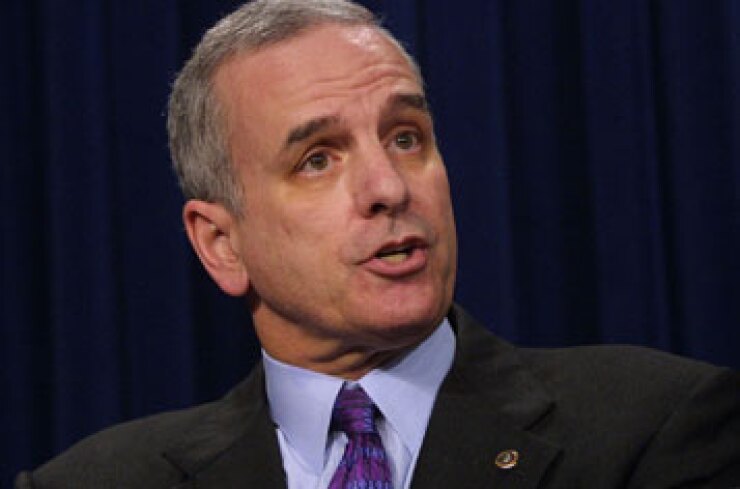
CHICAGO – Minnesota lawmakers won't immediately be called back to work to tackle a capital budget and long-term transportation funding plan after failing to act on both fronts before their session drew to a close, Gov. Mark Dayton said Monday.
"Whether or not there will be a special session I can't say," Dayton said at a news conference after the regular session's mandated closure. "I don't think rushing forward is the proper course."
Lawmakers worked hurriedly on Sunday's final regular session day to get a roughly $1 billion public works package, known as the "bonding bill," through, but 11th-hour haggling over projects doomed it. Unable to bridge differences on a long-term transportation deal, lawmakers appeared close on a short-term infusion of funds but that too fell by the wayside.
The final version of the capital budget that failed to clear both chambers relied on about $800 million of borrowing and other funding to get to about $1 billion. It would have supplied nearly $200 million for higher education projections, $278 million for transportation and $154 million for water infrastructure projects.
Dayton said he doesn't want the state to let passage of a major public works package go until next year as it "just delays our future economic growth."
A transportation package faced an even tougher road despite agreement that at least $600 million in annual spending is needed over the next decade.
Dayton and his fellow Democrat-Farmer-Labor Party members who control the Senate wanted a gasoline tax hike and other fee increases and bonding. Republicans, who control the House, favored the use of existing revenues and bonding. Lawmakers also couldn't bridge their political divide to reach agreement on metropolitan transit project which could jeopardize federal funds.
"I think those are both significant failures," Dayton said.
Lawmakers did agree on a tax bill to provide $259 million of tax cuts this year and new spending for education and rural broadband development. Some lawmakers expressed dismay that they were being asked to vote for the package without more details on specific spending plans. The additional spending in the current two-year budget adopted last spring was made possible with the state's $900 million surplus. The state passes a two-year operating budget in odd years and takes up a capital budget in even years.
Dayton said Monday he needs time to review all the bills passed over the weekend but he wouldn't "hold hostage" the tax cuts or other legislation in an attempt to use them as leverage to broker an agreement on the bonding bill or a transportation funding deal.
"Bonding and transportation should be considered and acted on their own merits," he said. Dayton said he expected in the coming days to meet with the legislative leaders but couldn't say whether, or how soon, a special session might be called.
Standard & Poor's last year revised its outlook on Minnesota's AA-plus rating to positive from stable. Fitch Ratings rates the state's general obligation debt AA-plus with a stable outlook and Moody's Investors Service rates it Aa1 with a stable outlook.





